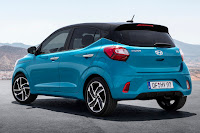Third-generation Hyundai i10 revealed
Unsurprisingly, the production version of the 2020 i10 isn’t as dramatic as the design sketch that Hyundai released last month. Nevertheless, this new A-segment contender looks pleasant enough, especially with the contrast provided by the optional black or red roof finishes.
Even city car buyers expect connectivity and advanced safety technologies nowadays. Therefore, the available infotainment system combines an 8” colour touchscreen, Android Auto and Apple CarPlay compatibility, satellite navigation (with real-time traffic and weather updates) and wireless device charging. In addition, Bluelink telematics pairs the driver’s smartphone and their i10 via a dedicated app.
As well as a camera-based forward collision avoidance feature, customers will be able to order lane keeping assistance, driver attention monitoring, speed limit warning and a rear-view camera.
Two petrol engines are being offered. A 1.0 litre, three-cylinder unit produces 66 bhp (49 kW / 67 PS) and 96 Nm (70 lb/ft) of peak torque, while the 1.2 litre, four-cylinder alternative promises more performance with 82 bhp (61 kW / 84 PS) and 118 Nm (87 lb/ft). Both can be mated to either a five-speed manual gearbox or a five-speed automated manual transmission.
A stop-start function comes as standard, but if saving fuel is a key requirement then a special Eco Pack might be of interest. This consists of altered gear ratios, smaller 14” wheels and four instead of five seats.
The 2020 Hyundai i10 is due to appear in public for the first time at the IAA Frankfurt International Motor Show later this month. UK prices and final specifications have yet to be confirmed.
Related posts:
Hyundai introduces the Kona Hybrid
For some reason, the Hyundai Venue now exists
Hyundai Tucson N Line unveiled
Even city car buyers expect connectivity and advanced safety technologies nowadays. Therefore, the available infotainment system combines an 8” colour touchscreen, Android Auto and Apple CarPlay compatibility, satellite navigation (with real-time traffic and weather updates) and wireless device charging. In addition, Bluelink telematics pairs the driver’s smartphone and their i10 via a dedicated app.
As well as a camera-based forward collision avoidance feature, customers will be able to order lane keeping assistance, driver attention monitoring, speed limit warning and a rear-view camera.
Two petrol engines are being offered. A 1.0 litre, three-cylinder unit produces 66 bhp (49 kW / 67 PS) and 96 Nm (70 lb/ft) of peak torque, while the 1.2 litre, four-cylinder alternative promises more performance with 82 bhp (61 kW / 84 PS) and 118 Nm (87 lb/ft). Both can be mated to either a five-speed manual gearbox or a five-speed automated manual transmission.
A stop-start function comes as standard, but if saving fuel is a key requirement then a special Eco Pack might be of interest. This consists of altered gear ratios, smaller 14” wheels and four instead of five seats.
The 2020 Hyundai i10 is due to appear in public for the first time at the IAA Frankfurt International Motor Show later this month. UK prices and final specifications have yet to be confirmed.
Related posts:
Hyundai introduces the Kona Hybrid
For some reason, the Hyundai Venue now exists
Hyundai Tucson N Line unveiled










%2BDashboard.jpg)

+Front+Side.jpg)
+Front+Side.jpg)

Comments
Post a Comment